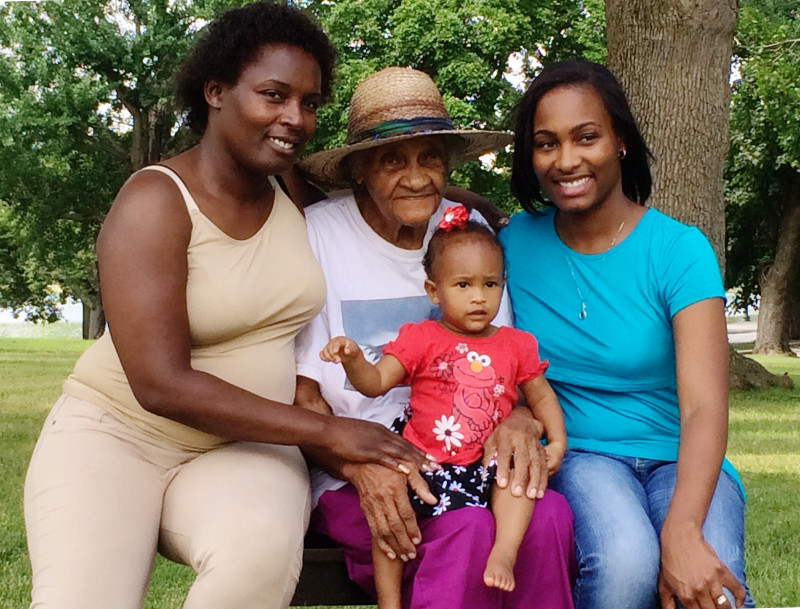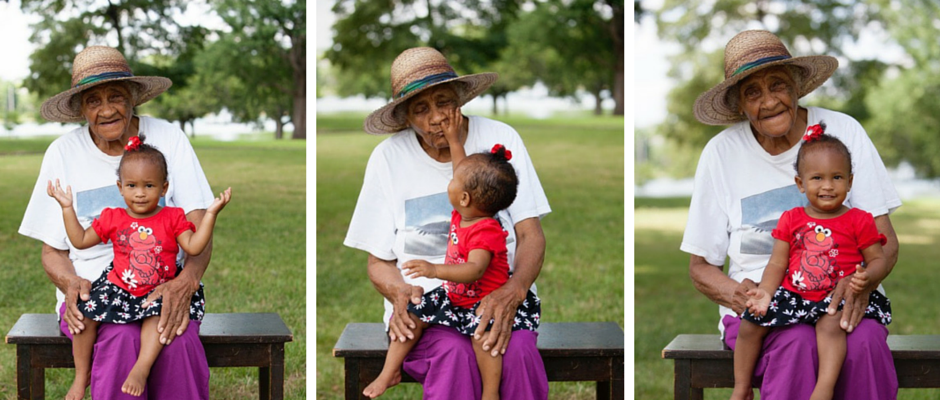When Cordelia Miller, 91, was a young mother working in the rural fields of Texas, she didn’t think twice about how to feed her baby.
“You went and got the baby from under the shade of the wagon, breastfed it when it was hungry, put the baby back under the wagon and went back to work,” says Ms. Miller, who attended a Nurture photo shoot in June focused on breastfeeding mothers.
Ms. Miller accompanied her daughter and great-granddaughter (a breastfeeding mother and subject of the shoot) and infant great-great-granddaughter to show her support for breastfeeding. Images from the photo session will be turned into lifesize cutouts for a City of Richmond campaign during World Breastfeeding Week August 1-7 to spark conversations about the topic.
Women from all different socioeconomic levels and backgrounds volunteered because they are passionate about breastfeeding becoming as commonplace and accepted as walking, sleeping, or eating. They are each pursuing a dream of improving the health of all mothers and children in our community. Many were accompanied by family members – husbands, partners, grandmothers – who were also staunch advocates for breastfeeding.
When Ms. Miller walked into the Round House at Byrd Park for her great-great granddaughter’s photo shoot, I knew immediately that something special was unfolding. While Nurture photographers worked to capture the mothers and their babies, I talked with Ms. Miller about what we were up to.
Her response to the the campaign, which is sponsored by the Richmond Health Action Alliance* and seeks to promote a breastfeeding-friendly and physically active community, was immediate and unequivocal.
“I don’t understand why we got away from it [breastfeeding],” she says, “It used to just be what we did.” She told us how proud she was of her great-granddaughter for breastfeeding her child.
She told us about giving birth to her own child in a segregated hospital here in Richmond, the city she’s lived in since she was 18. Miller brought to life, without bitterness or rancor, the racial divide that continues to separate our citizens and their access to health and wellness resources.
Grandma Miller talked about appreciating her own times, about being concerned about the times her grandchildren are growing up in. “But I guess we all like our own times better,” she says.
To have a great-great-grandmother in our presence – especially one who was such an obvious breastfeeding advocate – along with three generations of her family seemed like an occasion that needed to be honored. So we pulled a bench under the shade of a tall tree to snap a family portrait.

Cordelia Miller and granddaughter Joanne Lathon, great-granddaughter Tia Javier, and great-great granddaughter Mia.
Afterwards, I accompanied Ms. Miller for the short, slow walk back to her car. She said again, emphatically, “I don’t know why we got away from breastfeeding. It’s important. It puts the love back into it.”**
By the time we reached the waiting car, I was in tears, the good kind, the kind that fall when you know you are in the presence of a wise and mighty spirit.
Ms. Miller reminded me of how hard we’re working to get back to basic, primal human instincts – in part by supporting practices like breastfeeding that are grounded in biological and behavioral connection, which evidence suggests leads to much better health outcomes.
This is the essence of what we hope to do through Nurture – to provide resources that support and enhance the fundamental relationships and processes that emerge during the critical transition of pregnancy, birth, and early parenting. And to make access to these resources a level playing field, so we don’t perpetuate the disparities that hold our children back from being all that they could be.
Ms. Miller so beautifully reminded me of the essence of our goal: “to put the love back into it.”
Leslie Lytle is the Executive Director of Nurture.
*The Richmond Health Action Alliance is a Healthy Communities Action Team Initiative funded by the Virginia Foundation for Healthy Youth. The RHAA-HCAT seeks to reduce childhood obesity in the City of Richmond through policy, infrastructure, and environmental changes that promote a breastfeeding-friendly and physically active community.
**This post is not intended to suggest that babies that are fed formula are not loved. However, our culture does not prioritize the factors – like paid parental leave, cultural acceptance of breastfeeding, peer and professional breastfeeding support, limitations on the marketing of artificial milk, and support for human milk banking – that foster breastfeeding and the use of human milk rather than formula when breastfeeding does not go as planned or is not possible.
Photo Credits: Beth Furgurson Photography and Tasha Tolliver Photography



This was beautifully written
Thank you Tia. It was an honor and a delight to meet you and your family. Not often that you get to meet four (out of five!) generations at one time. Thank you for helping to raise awareness about breastfeeding in our community!
This was so beautiful tia Javier
This was beautifully written about some beautiful women!
Leslie, I sit here at my desk reading this article and I am full of tears. It reminds me of my grandmother and all of her stories about living in South Carolina. While working in the fields, she too would breast feed and console her children, then rush back to the fields before she was missed. I breast fed my children and as an educator, I appreciate you and want to say thanks for your efforts in promoting the goodness!
Queen Auntie I love this article about your life and legacy. Thank you for all you have done and are doing for our royal family. Praying for you without ceasing. I love so much..
Almost all the pieces of my heart came back together again, as I read of this Story. I can relate to it..it’s where the LOVE IS